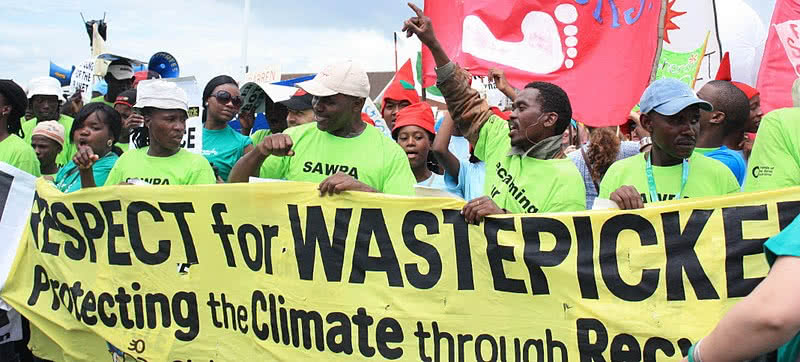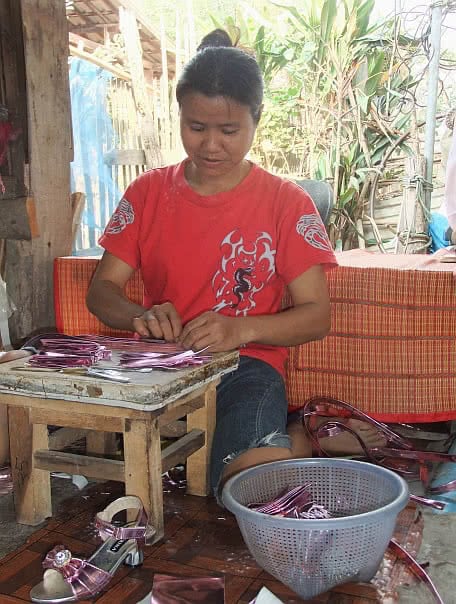
Organizing gives the poorest segments of the working class – those working in the informal economy, and especially women – a way to be seen and heard by decision makers with the power to affect their lives.
Increasingly, informal workers are coming together to form membership-based organizations (MBOs). MBOs are "those in which the members elect their leaders and which operate on democratic principles that hold the elected office bearers accountable to the general membership” (Chen et al. 2007).
An MBO is different from a conventional non-governmental organization (NGO) which, however well-intentioned or effective, operates as an outside entity, with no membership of those it serves.
Related Reading
- For guidance in how to build a strong MBO and examples from around the world, read The Only School We Have: Learning from Organizing Experiences Across the Informal Economy (also available in Spanish).
- See The History of Organizing Informal Workers for information.
The Need for Organizing
 Those working in the informal economy, and especially women, face many challenges including low and precarious income, difficult working conditions, lack of legal protection, numerous legal and physical risks, and often low social standing.
Those working in the informal economy, and especially women, face many challenges including low and precarious income, difficult working conditions, lack of legal protection, numerous legal and physical risks, and often low social standing.
Without support from strong organizations such as trade unions, the ability of the working poor in the informal economy to effectively challenge their conditions is very limited.
Informal workers need to organize to build the confidence and power to take collective action, to gain recognition, and for effective voice and representation. They need to organize to change the hostile economic, policy and legal environment in which they work. They need to organize if they are to improve their lives and protect their livelihoods.
Essential to this is the development of democratic, representative MBOs – trade unions, associations, cooperatives – as well as national and international alliances and networks.
The Benefits of Organizing
Joining forces in MBOs can provide many benefits to those who work in the informal economy, and in particular to women workers. When asked recently if organizing improved the social and economic conditions of their lives, 81 per cent of organized waste pickers from the Brazilian network Cataunidos responded yes.
Economic Benefits
Organizing allows workers to use their collective strength to negotiate better wages and conditions.
- A 2007-08 Gujarat Social Income and Insecurity Survey survey of 1,407 respondents found that members of the Self-Employed Women's Association (SEWA), on average, negotiated better rates, better working conditions and had more work than non-SEWA workers (see SEWA Academy’s monograph Empowering Women in an Insecure World: Joining SEWA Makes a Difference). SEWA helped negotiate with contractors and merchants to obtain a daily wage increase benefiting 8,000 bidi (cigarette) workers (SEWA 2008). SEWA has also negotiated higher piece-rates and fairer working conditions for subcontracted garment workers.
- The union of domestic workers in Uruguay – Sindicato Único de Trabajadoras Domésticas (SUTD) – negotiated collective agreements, for the first time in 2008 and again in 2010, setting minimum wages and providing for increases and overtime pay. Related information can be found in “From ‘Good Spirit’ to Employee? Strengthening Domestic Workers‘ Employment Rights in Latin America” (Meier 2010).
Organizing allows workers to receive better prices from those who buy their products.
- Organized waste pickers can demand higher prices for the materials they salvage and sell. In Brazil, where waste pickers have formed many cooperatives, members of Coopamare – one of the most successful of these – earn twice the country’s official minimum wage (Medina 2005, cited in Chen et al. 2005).
Organizing helps workers pool their limited resources and increase their access to financial resources.
- Poor workers can rarely access financial insitutions, but MBOs often offer opportunities for savings and credit.
- As stated in the Progress of the World’s Women, Chapter 5: “Savings and credit groups may help the working poor access microfinance services. Producers with little capital may buy raw materials at wholesale prices by combining their purchases.” (Chen et al. 2005: 76).
- SEWA has been supporting its membership with housing finance to improve their living conditions. Read Housing Finance for Poor Working Women: Innovations of the Self-Employed Women’s Association in India (Obino 2013).
Political Benefits
Organizing confers greater visibility and validity on informal workers, which in turn gives them influence in policy arenas.
- Organized homeworkers in the UK fought for and won the right to be included under national minimum wage legislation.
- Organized street vendors have advocated with municipal officials to protect the right of vendors to earn their livelihoods trading in public areas. In India, the National Alliance of Street Vendors of India (NASVI) was influential in the development of the National Policy for Street Vendors (Chen et al. 2005).
- In the state of Minas Gerais in Brazil, waste picker organizations were able to help shape legislation regarding a solid waste management policy that includes articles dealing with the social inclusion of waste pickers. It became law in 2009 (Dias 2010).
- Waste pickers have achieved visibility and validity on the world stage through MBOs, networks and alliances. Since 2008, waste picker representatives have presented their demands at conferences relating to the United Nations Framework Convention on Climate Change (UNFCCC). The Clean Development Mechanism methodology affecting waste picker livelihoods came under revision in 2010-2011, and the WIEGO-GAIA partnership was involved in facilitating waste picker input into these processes.
- In Durban, South Africa, street vendor organizations came together, supported by the group Asiye eTafuleni, StreetNet, unions and other civil society organizations, to fight the threat that the Warwick Junction market would be demolished to make way for a formal mall, displacing the street vendors. The mall proposal was subsequently dropped.
Social Protection Benefits
Organizing allows informal workers to access existing social protection systems.
- In India, the Bidi and Cigar Welfare Fund Act, and the Bidi and Cigar Cess Act, implemented in the 1980s provide social security schemes such as health care, child care and housing for bidi workers; similar schemes have been implemented for other sectors in India.The 2007-08 GSIS survey found SEWA families were more likely to benefit from medical insurance and to take advantage of government schemes (SEWA Academy 2010).
- South African domestic workers’ organizations fought for years to have domestic workers gain access to unemployment, death, health, and maternity benefits under the Unemployment Insurance Act. This was finally achieved in 2003 (Chen et al. 2005).
- PATAMABA, an MBO in the Philippines, has helped self-employed home-based workers to access social insurance via an Automatic Debit Account arrangement.
MBOs can offer improved support systems for their members.
- Organized groups run schools, child care centres and health centres. For example, the Accra Market Women’s Association in Ghana developed a programme to care for children while their mothers conducted business, with funds from the Accra City Council (Chen et al. 2005).
- Some MBOs mobilize assistance during disaster or hardship. For example, after the devastating 2004 tsunami, the Siyath Foundation, a member of HomeNet South Asia that works with coir weavers in Sri Lanka, distributed much-needed items and provided legal and psycho-social support. They also worked with UNIFEM on the creation of a long-term rehabilitation programme focused on organizing members into a cooperative and mechanizing coir production (Chen et al. 2005).
MBOs are at the forefront of improving working conditions, including fostering occupational health and safety (OHS) approaches for informal workers.
- Waste picker organization KKPKP has been addressing OHS for the waste picking sector in Pune, India for many years. KKPKP has won concessions from the Pune municipality, which now pays health insurance premiums for KKPKP waste pickers and has agreed to provide these workers with basic protective gear. KKPKP is also studying health topics, such as the ways in which door-to-door waste collection methods can affect health and safety conditions for waste pickers.
Intangible Benefits
Organizing’s positive effects can lead to improved self-esteem and both social and personal empowerment among informal workers.
- The growing organization and advocacy work of waste pickers has helped this once maligned group understand the importance of its contribution economically and environmentally (for more on this contribution, see the sector page on waste pickers).
- For women, greater bargaining power and earning potential in the workplace (even when the workplace is at home) can translate into increased power within the household and community (Chen and Snodgrass 2001; Kabeer 1998, as cited in Chen et al. 2005).
- In general SEWA members responding to the GSIS study were more confident than their non-SEWA counterparts, were more likely to value and improve skills, were less accepting of poverty and expected more from both life and society (SEWA Academy 2010).
Informal workers are affected by forces at the local, national, regional and international level, so it is important that workers organize at all levels.
- At the individual, local and national level, organizing can help workers share resources to achieve improved incomes, negotiate with employers or authorities to improve working conditions, as well as to influence policies, programmes and regulations that can directly impact them.
- Regional organizations allow workers to share information and learn from successes in other locations, while also influencing regional decision makers.
- International networks give workers a strong, collective voice on the global stage to foster changes in international instruments and policies--which can lead to changes in national legislation.